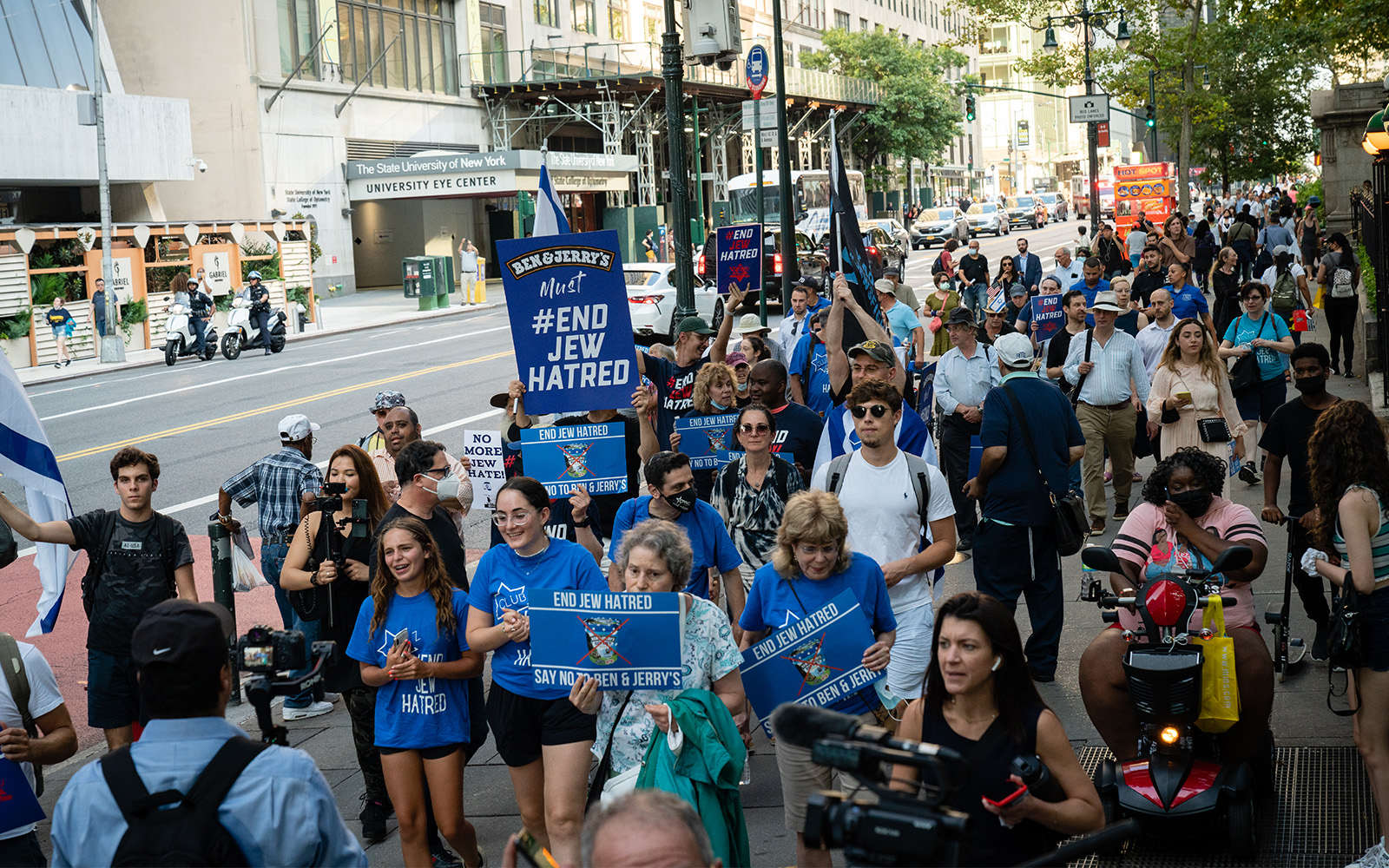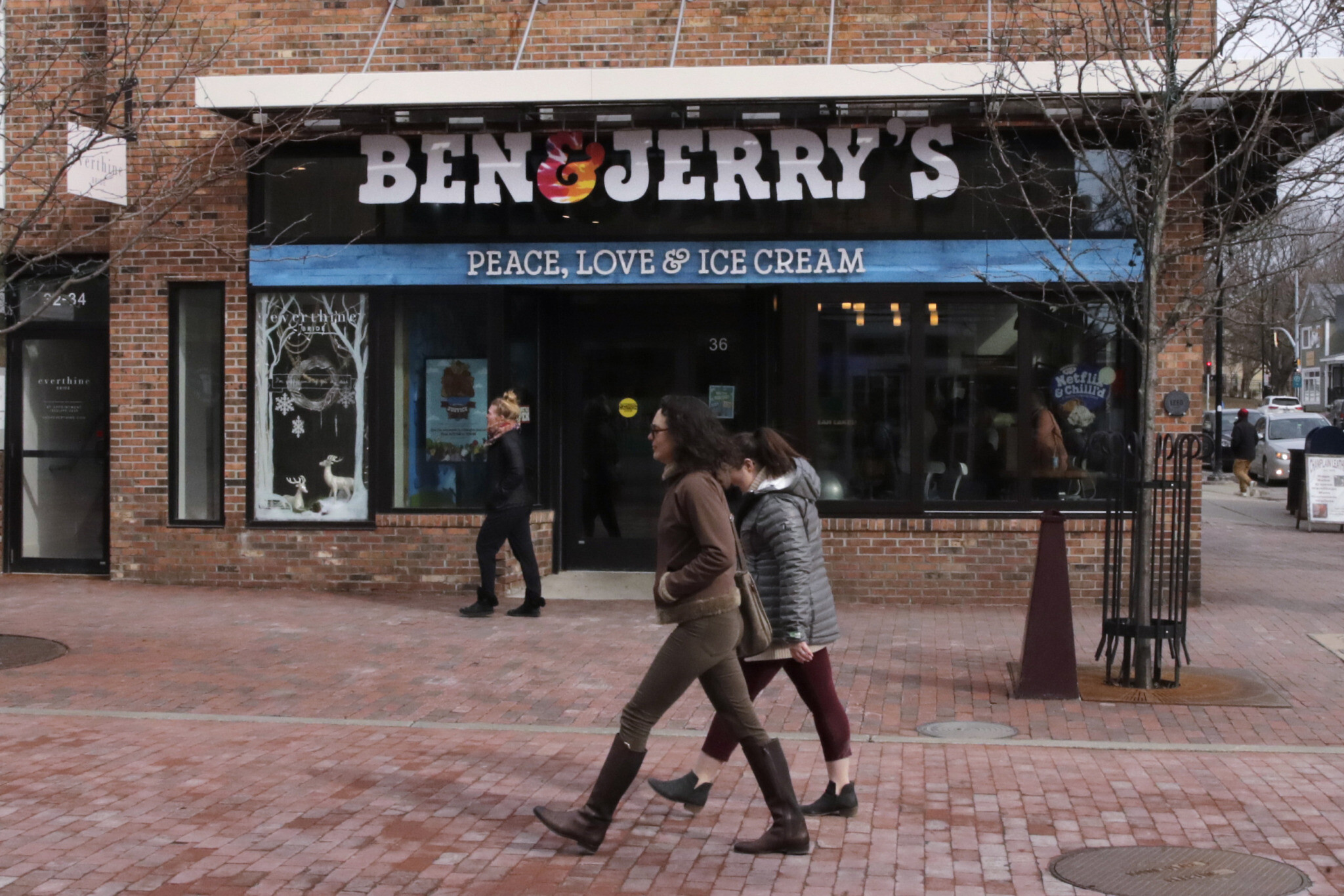NEW YORK — Ben & Jerry’s filed a US federal lawsuit on Tuesday against its parent company, seeking to block an agreement with an Israeli firm that would allow sales of its product in the West Bank, as the legal battle over the ice cream maker’s attempted boycott of settlements continued.
The Vermont-based firm filed the civil suit in the US Southern District Court of New York against Conopco, the main US branch of Unilever, the parent company of Ben & Jerry’s.
The lawsuit argues that Unilever breached its acquisition deal with Ben & Jerry’s by announcing an agreement last week with the Israeli vendor that produces and distributes the ice cream in the country to continue sales in the West Bank, after the Ben & Jerry’s board said it was halting sales in “occupied Palestinian territory” last year.
Unilever reached an agreement with Avi Zinger, the owner of Ben & Jerry’s Israel, and his company American Quality Products (AQP), giving it permanent independence to continue sales in Israel and the West Bank with the Ben & Jerry’s logos in Hebrew and Arabic, but not English. The boycott was set to come into effect at the end of 2022, when Ben & Jerry’s contracts with Zinger were due to expire.
Ben & Jerry’s is seeking an injunction to prevent the move, as well as damages from the agreement and all profits Unilever makes from it. Ben & Jerry’s had previously said it would no longer profit from sales in Israel.
The court denied a Ben & Jerry’s request for a temporary restraining order and preliminary injunction against Unilever’s agreement with Zinger.
In response to the lawsuit, Unilever told The Times of Israel it “had the right to enter this arrangement. The deal has already closed. We do not comment on pending litigation.”
Avi Zinger, Israeli manufacturer and distributor of Ben & Jerry’s ice cream (YouTube screenshot)
Alyza D. Lewin, president of the Louis D. Brandeis Center for Human Rights Under Law, which represents Zinger and AQP, said in response, “It’s a done deal. Unilever chose the morally correct, socially just and principled path when it ensured that Ben & Jerry’s ice cream would always continue to be produced and sold in Israel and the West Bank.”
“Avi Zinger stands arm in arm with Unilever and commends Unilever’s decision to forcefully defend its agreement with him,” Lewin told The Times of Israel.
Unilever and Ben & Jerry’s have been out of sync on the settlement boycott since the start and seemed to have been increasingly at odds. Tuesday’s legal filing appeared to be the first direct legal dispute between the two sides.
The lawsuit against Conopco and Unilever seeks to block the transfer of Ben & Jerry’s branding to the Israeli company and prevent sales in the West Bank without approval from the ice cream company, and to dissolve the agreement Unilever made with Zinger. Unilever mostly conducts its US business through Conopco, which is wholly owned by Unilever United States. The lawsuit also refers to the defendant as Unilever. It wasn’t immediately clear why Ben & Jerry’s filed the lawsuit against Conopco, and not against Unilever US, although it may have been for reasons related to the case’s jurisdiction.

Pro-Israel demonstrators protest against Ben and Jerry’s over its boycott of the West Bank, and against antisemitism, in Manhattan, New York City, on August 12, 2021. (Luke Tress/Flash90)
The dispute focuses on the autonomy of the Ben & Jerry’s board and its commitment to its “core values” and social mission, which the company says is integral to its identity and business success. Ben & Jerry’s says its owners violated agreements related to its board and social commitments by transferring the brand to the Israeli branch.
When Unilever acquired Ben & Jerry’s in 2000, it granted the board autonomy “for safeguarding the integrity of the essential elements of the Ben & Jerry’s brand-name,” the lawsuit said. The Ben & Jerry’s board made the West Bank boycott announcement independently of Unilever. The UK-based multinational wholly owns Ben & Jerry’s and has some authority over financial and operational matters, but the ice cream maker retained its independence on other issues in the acquisition agreement.
Unilever’s decision to go against the Ben & Jerry’s board and allow sales in the West Bank violated their merger agreement, the lawsuit alleges, calling it an attempt to “usurp the Board’s contractual authority and nullify its previous decision prohibiting the sale of Ben & Jerry’s products in the West Bank.” It also said transferring the logos to the Israeli company in a unilateral decision was a violation of its merger agreement.
The lawsuit noted that Unilever said it “recognized the right” of Ben & Jerry’s to make decisions about its “social missions” after the settlement boycott was announced last year, but “abruptly reversed course” with the agreement last week, telling the board about it on June 23, shortly before it was made public.
“Stunned, the Chair of the Independent Board attempted to engage in discussions with Unilever, requesting a copy of the transfer agreement and time for the Independent Board to review. She received neither,” the lawsuit said.
“Unilever’s unilateral decision was made without the consent of Ben & Jerry’s Independent Board of Directors, the entity contractually empowered with protecting Ben & Jerry’s brand,” the lawsuit said. It seeks an injunction restraining Unilever from “violating the express terms” of their merger agreement to “preserve the status quo and protect the brand and social integrity Ben & Jerry’s has spent decades building.”
The board decided to file litigation against the move on Friday in a 5-2 decision, with its two Unilever appointees dissenting.
The lawsuit refers to sales in the West Bank only and does not refer specifically to settlements, Jerusalem or sales in Israel at any point.

Pedestrians walk on Church St., past the Ben & Jerry’s shop, in Burlington, Vermont, March 11, 2020. (AP Photo/Charles Krupa)
Ben & Jerry’s said its progressive ethos is integral to the company and its business success, tracing its “social mission” back to its Jewish founders, who decided to make the business “more than just an ice-cream company” in the early 1980s.
“As a result of its decades of advocacy, Ben & Jerry’s had become the ‘gold standard’ for corporate activism,” the lawsuit said, submitting positive media coverage of its advocacy as evidence.
The lawsuit was signed by Anuradha Mittal, the chair of the Ben & Jerry’s board.
Ben Cohen, one of the company founders, submitted a statement saying that he supported the lawsuit and the West Bank boycott, and believed the Unilever decision violated the acquisition agreement. Jerry Greenfield, the other co-founder, included a statement in support of Ben & Jerry’s social mission, without addressing the West Bank dispute.
The lawsuit said the board started receiving complaints about sales in the West Bank in 2013 and began looking into the issue, and that its decision to withdraw from the area was the result of a 2019 fact-finding mission to Israel and the West Bank. It did not say why the decision was not announced until 2021. Ben & Jerry’s was under heavy pressure from anti-Israel activists to cut sales to Israel at the time due to the war between Israel and Gaza terror groups.
Zinger and his company refused to comply. Their license to sell the ice cream was set to expire at the end of 2022, meaning the boycott had not yet come into effect.
Ben & Jerry’s announcement of the boycott triggered massive blowback for Unilever. A number of US states enacted laws barring Israel boycotts, pulling close to a billion dollars from Unilever, and the company’s value plummeted over $20 billion in the months after the boycott announcement, at a time when the market was on the rise. Over 30 states have anti-boycott legislation and 12 state attorneys general and treasurers from seven states also called on Unilever to reconsider the boycott.

Pro-Israel demonstrators protest against Ben & Jerry’s over its boycott of the West Bank, and against antisemitism, in Manhattan, New York City, on August 12, 2021. (Luke Tress/Flash90)
Ben & Jerry’s is a wholly-owned subsidiary of Unilever, despite its board’s independence on some matters. Unilever is a UK-based conglomerate and one of the largest consumer goods companies in the world, with some 400 brands and a market value of around $116 billion.
Ben & Jerry’s Israel and Zinger had sued Unilever in US federal court in New Jersey, saying the company was violating US and Israeli laws and illegally terminating their business relationship. The agreement announced last week appeared to have resolved the dispute, until Tuesday’s court filings.
Under the terms of his deal with Unilever, Zinger has independence to produce and sell Ben & Jerry’s products in Israel and the West Bank in perpetuity. The monetary terms of the arrangement were kept confidential.
Israel and its supporters hailed the agreement as a major victory against the boycott movement against Israel. Ben & Jerry’s did not explicitly endorse the Boycott, Divestment and Sanctions (BDS) movement targeting the entire Jewish state, but its settlement boycott has been lumped in with the movement by activists on both sides and the BDS movement got on board with its boycott.
The decision sparked uproar in Israel and among some US Jewish groups, many of whom called it antisemitic, since the company has no boycotts against any other area of the world.
Critics of the attempted West Bank boycott note that Ben & Jerry’s allows its products to be sold in states with atrocious human rights records, including Russia, Saudi Arabia, Syria, Iran and China. The company has not taken action regarding other disputed territories including Tibet, Crimea, Western Sahara and Kashmir.